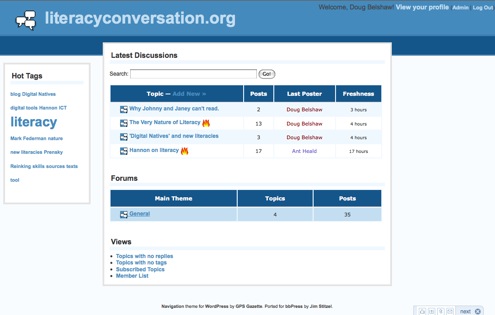As regular readers of this blog know, I’m (still!) studying towards my Ed.D. on the subject of ‘digital literacies’. The subject crops up in various networks of which I’m part from time-to-time, not least via my Twitter network.
Twitter only allows 140 characters which can be a little limiting sometimes and tweets are hard to collate and archive. As a result, I decided we needed a old-skool forum. And so, ladies and gentlemen, I present to you:

It’s powered by bbPress, the sibling of the excellent WordPress (which powers this blog). It was super-easy to setup and there’s already some first-class debate and conversation going on. Head on over and take part! 😀
This concept map took me ages. So long, in fact that I’ve no big long words or energy left to pad out this blog post longer than it needs to. Suffice it to say that the references on it can be found on my wiki. 🙂
I created the concept map using XMind, which is Open Source, cross-platform software that allows you to upload and collaborate. I found it very easy to use and would recommend it as a perfect blend of online and offline functionality! 😀
I’ve been asked under what license I’m releasing this mindmap. Here’s my answer:

Digital Literacy Ed.D. thesis concept map by Doug Belshaw is licensed under a Creative Commons Attribution-Noncommercial-Share Alike 3.0 Unported License.
Based on a work at share.xmind.net.
In the beginning was ‘The Conversation’, ‘The New Story’, or how new technologies had the potential to change the educational landscape. What could we do with these new technologies. Did it mean the end of schools? This was from around 2003/4 up until 2006.
From around 2006 until 2008, conversations centred around applying these new technologies in the educational landscapes. What are the barriers to implementation? What’s the best tool for this particular learning outcome? I’ve just spotted this new Web 2.0 tool – has anyone used it in their classroom yet? Things got a lot quicker from 2007 onwards by many educators beginning to use Twitter.
At the end of 2008 and the beginning of 2009 a new conversation is starting. Perhaps as a consequence of what has been termed the ‘Credit Crunch‘, there’s a renewed focus on the signal/noise ratio. What’s important in education? What do we need to see in practice for things to change? Is literacy in the 21st century different?
I just hope this conversation doesn’t end before I finish my Ed.D. thesis! 😮


![Reblog this post [with Zemanta]](http://img.zemanta.com/reblog_e.png?x-id=cc2f2850-a033-48f2-b40c-fa995b84c5b8)


![Reblog this post [with Zemanta]](http://img.zemanta.com/reblog_e.png?x-id=a22f5c18-1559-4cec-9544-44b892a86106)